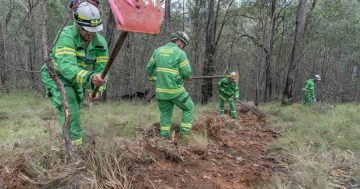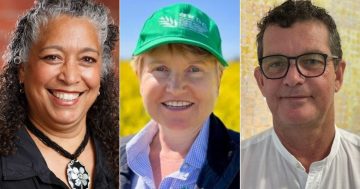 1. This week 10 years ago, the Rural Industries Research and Development Corporation (RIRDC) launched a guide for gardeners, farmers and everyday Australians to help Australia’s bee population survive.
1. This week 10 years ago, the Rural Industries Research and Development Corporation (RIRDC) launched a guide for gardeners, farmers and everyday Australians to help Australia’s bee population survive.
Chairman of the Pollination Program R&D Advisory Committee, Gerald Martin said pests and diseases were an ever-increasing threat, including the deadly Varroa mite, which had wreaked havoc across the globe.
“Sixty-five per cent of agricultural production is reliant on pollination by bees to produce fruit, vegetables and seeds and honeybees are coming under increasing pressure from urbanisation, bushfires, changing agricultural practices and changing land management practices,” Mr Martin said.
2. Prime Minister, Julia Gillard announced the terms of reference for a Royal Commission into the sexual abuse of children due to begin later in 2013, saying it would focus on “systemic failures and issues”.
Ms Gillard said the Government would ensure allegations of abuse raised by the Commission would be investigated and, if proven, prosecuted.
“The Commissioners can look at any private, public or non-government organisation that is, or was in the past, involved with children, including government Agencies, schools, sporting clubs, orphanages, foster care, and religious organisations,” Ms Gillard said.
3. Victorian Attorney-General, Robert Clark announced the establishment of a Privacy and Data Protection Commissioner along with reforms to strengthen the security of data, privacy and protection of personal information within the Victorian public sector.
Mr Clark said the new Commissioner would be responsible for oversight of the current Victorian privacy and law enforcement data security regimes, as well as the implementation of a new Victorian Protective Security Policy Framework.
“The new office of the Privacy and Data Protection Commissioner will bring together the skills and resources of the Privacy Commissioner and the Commissioner for Law Enforcement Data Security,” Mr Clark said.
4. Victoria’s workplaces had the safest year on record in 2012, according to WorkCover figures released by the State’s Assistant Treasurer, Gordon Rich-Phillips.
The figures showed that 18 people died in Victorian workplaces in 2012 — seven fewer than in 2011 and equal to the previous record low in 2005.
The number of Victorians injured at work also fell to a new low.
Mr Rich-Phillips said the improvement was a significant achievement and added to the State’s track record on workplace safety.
“In 2012 national data confirmed Victoria’s position as having the safest workplaces of any State or Territory in Australia, and that’s a credit to employers, workers and the efforts of the WorkSafe team,” Mr Rich-Phillips said.
5. The Royal Adelaide Hospital’s Burns Centre was recognised as one of the world’s best, receiving renewed accreditation from the American Burn Association and American College of Surgeons — the only burns service outside North America to be recognised as such.
South Australia’s Acting Minister for Health, Pat Conlon said the international accreditation was proof of the exemplary standard of care provided by the Centre’s staff.
“This accreditation proves the level of commitment by our Adult Burn Specialists to providing the best possible health care to their patients,” Mr Conlon said.
6. And a decade ago, Western Australia created a new national park, on the Burrup Peninsula, bringing to 100 the total number of parks across the State.
Minister for Environment, Bill Marmion said the new Murujuga National Park would cover almost 5,000 hectares of the northern and most eastern part of the peninsula, including 86 per cent of the Dampier Archipelago National Heritage Place.
“The Burrup Peninsula is internationally renowned for its ancient Aboriginal rock art and has the biggest ‘gallery’ with the highest concentration of engravings of any known site in the world,” Mr Marmion said.
“The area is also known for its significant vegetation and diverse terrestrial fauna and has outstanding scenic landscapes that offer nature-based recreation and tourism opportunities.”











